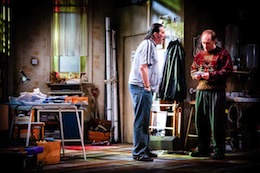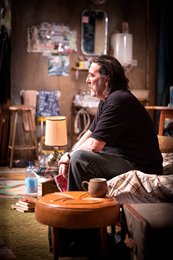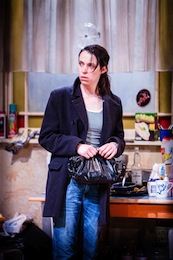Conor McPherson’s new play is set in the ground-floor bedsit of a Dublin house, owned by Maurice (Norton), who crankily polices it from upstairs. In the intimate Donmar space, where actors enter from all sides, it feels like we are in the house too. The high ceiling and stained-glass French doors of Soutra Gilmour's set hint towards something quite luxurious, but in Tommy’s (Hinds) hands the flat has become a bit of a hoarder’s lair, stocked up with dirty dishes, two beds – one for him and one for his mate Doc (McElhatton) – and the dog biscuits he eats. There is no dog.
 The play opens as an embarrassed Tommy leads Aimee (Dunne) through this mess so she can clean herself up in the bathroom. She’s a prostitute he’s just rescued from being beaten up by her boyfriend: word is she charges €40 for a hand-job. With nowhere else to go, she stays. The drama arises out of this random encounter, as strangers discover each other in front of us. So we learn that Aimee has an abusive boyfriend, Kenneth (Gleeson) – who appears three-quarter ways in to wreak havoc – and a child. But we find out more about Tommy, in so far as we are immersed in his world: not only about his messiness and odd eating habits, but about his ex-wife, his children, his wheeling and dealing with Doc, his relationship with Maurice and his deceased wife Maura. Brilliantly played by Hinds, this is very much his story, which others illuminate.
The play opens as an embarrassed Tommy leads Aimee (Dunne) through this mess so she can clean herself up in the bathroom. She’s a prostitute he’s just rescued from being beaten up by her boyfriend: word is she charges €40 for a hand-job. With nowhere else to go, she stays. The drama arises out of this random encounter, as strangers discover each other in front of us. So we learn that Aimee has an abusive boyfriend, Kenneth (Gleeson) – who appears three-quarter ways in to wreak havoc – and a child. But we find out more about Tommy, in so far as we are immersed in his world: not only about his messiness and odd eating habits, but about his ex-wife, his children, his wheeling and dealing with Doc, his relationship with Maurice and his deceased wife Maura. Brilliantly played by Hinds, this is very much his story, which others illuminate.
Until Kenneth arrives at least, the writing feels very gentle and warm; the exchanges loose, even banal. But it also feels wittier than some of McPherson’s other plays, ably helped by a super cast that cleverly dice up the lines. “Doc…short for Brian…” the play’s fool explains of his name at one point, “cause people don’t have all day to be sayin’ your name.” Yelped in an Irish accent, “me hole” sounds funnier in London than it does in Dublin.
 McPherson's play seems mainly interested in the mystery of the chance encounter: how one life suddenly intersects another, setting in motion a chain of surprise events and connections. This is reflected in the action too, which McPherson allows to clip along, rather than carving out moments, or honing images. In addition to the main plot, there are a number of references to characters feeling lost, out of sync with time, or unsure about how to act.
McPherson's play seems mainly interested in the mystery of the chance encounter: how one life suddenly intersects another, setting in motion a chain of surprise events and connections. This is reflected in the action too, which McPherson allows to clip along, rather than carving out moments, or honing images. In addition to the main plot, there are a number of references to characters feeling lost, out of sync with time, or unsure about how to act.
It’s up to Doc and Maurice to address these metaphysical questions directly. Humorously and at times touchingly played by McElhatton, Doc keeps a copybook of his thoughts on nature and time. Yoga, levitation, “time waves” are just some of the eclectic interests he mentions. At one point he delivers a mini-lecture on timelessness and black-holes, which seems at odds with the low intelligence we are led to believe he otherwise possesses.
Maurice drunkenly betrays his steeliness towards the end of the play, ranting at Tommy about evil and meaning, wondering where “the sweetness” has all gone: “The country’s a mess and we’re looking for people like you to lead us into the light?” he despairs at one point. Maurice is also the conscience of the play, advising Tommy that you only get a few shots at life, if you’re lucky: “Two, three goes maybe. When you hit the right groove you’ll click right in there.”
 But despite great performances, I found the play’s gender politics really questionable. As with other McPherson plays (This Lime Tree Bower, Rum and Vodka, The Weir) here we have another male-dominated world, with a very fraught relationship to women: Maurice mourns his dead wife; Tommy is separated, and claims he would rather pay for sex than have a relationship; and Doc, as he reveals himself, can’t even get it up.
But despite great performances, I found the play’s gender politics really questionable. As with other McPherson plays (This Lime Tree Bower, Rum and Vodka, The Weir) here we have another male-dominated world, with a very fraught relationship to women: Maurice mourns his dead wife; Tommy is separated, and claims he would rather pay for sex than have a relationship; and Doc, as he reveals himself, can’t even get it up.
McPherson’s device for exploring this milieu is to introduce a female prostitute who has been beaten up by her boyfriend. His writing doesn’t exactly degrade her, but it doesn’t give her anything interesting to say or do either. She never develops beyond being the stimulus for men to reflect on men, and their experience of the world. Though in a beautiful performance a compelling Dunne manages to suggest rich layers of light and shade in the role, it’s underwritten. While there are similarities with the part of Valerie in The Weir – another female who arrives into a male universe out of the blue – this character isn’t even given the opportunity to speak at length.
In one of the last scenes Aimee rejects Tommy’s final bid to rescue her, and walks away. It feels like the end, but as if not trusting his first instinct, McPherson includes another scene in which she comes back. (After the performance, some people debated whether she was alive or dead here, but she seemed very alive to me.) Leaving wouldn’t have solved everything, but some kind of a feminist stance might just have complicated the play’s uncomfortable privileging of masculine metaphysics.
Fintan Walsh is lecturer in Theatre and Performance in the Department of English at Birkbeck, University of London. His most recent book is Theatre & Therapy (Palgrave Macmillan, 2013).